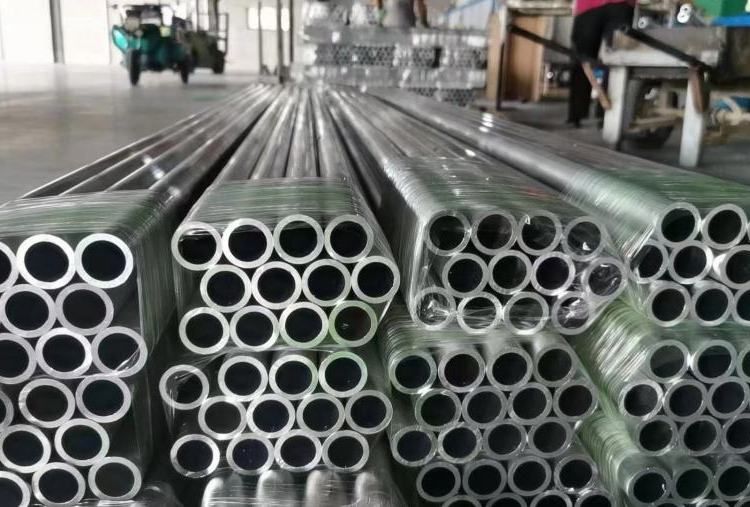Marine Grade Aluminum Pipes For Shipbuilding
In the field of shipbuilding, marine grade aluminum pipes must meet the certification standards of classification societies (such as ABS, DNV GL, LR, etc.) and have excellent corrosion resistance, strength and lightweight characteristics.

Marine grade aluminum pipes for shipbuilding mainly use 5000 series aluminum-magnesium alloys and 6000 series aluminum-magnesium-silicon alloys. Other alloys are also used in some special scenarios, as follows:
1. 5000 series aluminum-magnesium alloys (Al-Mg series)
Typical grades: 5083, 5052, 5456, 5086, 5059
Features:
- Excellent corrosion resistance: especially resistant to seawater corrosion, no additional anti-corrosion coating is required, suitable for underwater parts of hulls, deck structures, piping systems, etc.
- Good weldability: no need for heat treatment strengthening, stable performance after welding, suitable for large-scale structural welding assembly.
- Moderate strength: yield strength is about 110-240MPa, density is about 2.68g/cm³, and specific strength (strength/weight) is better than steel.
Application scenarios: hull, ballast water pipeline, deck support structure, seawater cooling system.
2. 6000 series aluminum-magnesium-silicon alloy (Al-Mg-Si series)
Typical grades: 6061, 6082, 6063
Features:
- Heat-treatable strengthening: After T6 (solid solution + artificial aging) treatment, the yield strength can reach 240-310MPa, which is higher than the 5000 series alloy.
- Balanced comprehensive performance: It has good corrosion resistance, processability (good extrusion formability) and weldability, and is suitable for load-bearing structural parts.
Application scenarios: hull frame, mast, support beam, mechanical connector, high-pressure pipeline.
The specifications of marine grade aluminum pipes for shipbuilding must comply with ASTM, ISO, GB or classification society customized standards, mainly including:
1. Pipe type
- Seamless pipe: high strength, suitable for high-pressure systems (such as hydraulic pipes, fuel pipes).
- Welded pipe (welded pipe): low cost, suitable for large diameter, non-high pressure structures (such as hull drainage pipes).
2. Size parameters
- Outer diameter (D):
Small diameter: Φ10mm~Φ100mm (commonly used in pipeline systems);
Large diameter: Φ100mm~Φ500mm (used for structural support, hull frame), some special specifications can reach Φ1000mm or more.
- Wall thickness (t): 0.5mm~50mm, designed according to pressure level and structural strength (such as high-pressure pipe wall thickness can reach more than 20mm).
- Length (L): The fixed length is usually 6m, 12m, or customized according to the hull design (such as extra-long pipes during segmented construction).
3. Shape
- Round tube: most commonly used, suitable for pipes, columns, etc.
- Square tube/rectangular tube: used for hull frames, support structures (such as deck beams), the cross-sectional size is commonly 50×50mm~300×200mm.
- Special-shaped tubes: customized according to design requirements (such as elliptical tubes, grooved tubes).
4. Standard reference
- ASTM B221: American aluminum extrusion tube standard, covering alloys such as 6061 and 6082.
- ISO 6361: Standard for aluminum alloy extrusion profiles for ships and marine technology.
- Classification society specifications: such as the mechanical properties and certification requirements for aluminum tubes in ABS's "Guide for Building and Classing Aluminum Vessels".
Core advantages of marine grade aluminum pipes for shipbuilding:
1. Lightweight and fuel economy
The density of aluminum alloy is about 1/3 of that of steel, and the weight of the hull can be reduced by 30%~50%, which directly reduces the ship's navigation resistance and fuel consumption (fuel consumption can be reduced by 10%~20%), while increasing speed and load capacity.
2. Excellent seawater corrosion resistance
A dense oxide film can be naturally formed on the surface of the 5000 series aluminum alloy to resist seawater and salt spray erosion, and no frequent painting and maintenance is required (the maintenance cost is reduced by more than 50% compared with steel structures). It is especially suitable for parts that are immersed in seawater for a long time (such as hulls and ballast tank pipes).
3. High strength and good toughness
After heat treatment, the strength of the 6000 series aluminum alloy is close to that of low-carbon steel, and it still maintains good toughness in low-temperature environments (such as polar routes), avoiding the risk of low-temperature embrittlement of steel and improving ship safety.
4. Excellent processing and welding performance
Aluminum alloys can be flexibly formed through processes such as extrusion, bending, and welding (such as TIG and MIG welding), which is suitable for the manufacture of complex hull structures and shortens the construction cycle. The 5000 series aluminum alloy does not require heat treatment after welding, and the 6000 series aluminum alloy can restore its strength through local aging after welding.
5. Environmental protection and sustainability
Aluminum alloy can be 100% recycled and reused, and the energy consumption of recycling is only 5%~10% of the original material, which is in line with the green environmental protection trend of the shipbuilding industry; and there is no rust product to pollute the seawater, meeting environmental protection regulations (such as IMO anti-pollution requirements).
6. Classification society certification guarantee
Marine grade aluminum pipes certified by classification societies such as ABS and DNV GL must undergo strict mechanical property tests, corrosion resistance tests and welding process assessments to ensure structural safety throughout the life cycle of the ship and meet international maritime standards.
Application scenario examples of marine grade aluminum pipes for shipbuilding:
- Hull structure: hull, deck frame, hull beam of high-speed boats and yachts;
- Pipeline system: seawater cooling pipes, ballast water pipes, fuel pipes, hydraulic pipes;
- Equipment components: masts, guardrails, cabin partitions, ventilation ducts;
- Special ships: low-temperature resistant structural parts of scientific research ships and polar icebreakers, and lightweight pressure-resistant parts of deep-sea ships.
Marine grade aluminum pipes for shipbuilding play a key role in modern ships (especially high-speed ships, yachts, and special ships) due to their light weight, corrosion resistance, and reliability. When choosing 5000 series or 6000 series aluminum alloys, it is necessary to comprehensively consider the stress of the hull parts, the degree of environmental corrosion, and processing requirements, while strictly following the classification society standards to ensure safety.








